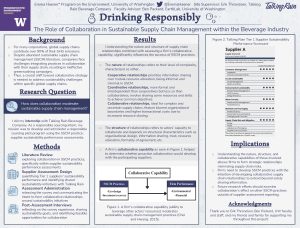DRINKING RESPONSIBLY: THE ROLE OF SUPPLIER PERFORMANCE ASSESSMENTS IN COLLABORATIVE SUSTAINABLE SUPPLY CHAIN MANAGEMENT
Most companies’ supply chains constitute a substantial source of environmental and social impacts, accounting for over 90% of their total greenhouse gas (GHG) emissions. The abundance of sustainable supply chain management (SSCM) literature developed in the past two decades has created challenges for companies seeking to integrate SSCM practices and apply frameworks to their specific supply chain. Supplier sustainability assessments are frequently employed to quantify a supplier’s sustainability performance across diverse sustainability aspects. However, companies underutilize supplier assessments as an effective supply chain management tool when they only focus on how their suppliers perform. Instead, businesses need to use supplier sustainability assessments to identify shared sustainability goals with suppliers and catalyze collaborative partnerships. The purpose of this study was to explore how supplier sustainability performance assessments can promote effective supply chain collaboration and how a firm’s collaborative capabilities and general supply chain collaboration impact its success. This study conducted within a global beverage manufacturer, encompassed a literature review, the design and administration of a supplier sustainability assessment, and supplier interviews. The research reveals that collaborative relationships and a firm’s collaborative capabilities significantly influence the success of supplier assessments in identifying collaborative opportunities. The study also highlights the importance of accurate assessment criteria, a commitment to collaborative sustainability goals, and enhanced technological capabilities in assessment tools. Ultimately, this research contributes to the field of sustainable supply chain management and collaboration by operationalizing supplier performance assessments as tools to promote collaboration and address sustainability challenges within global supply chains.
